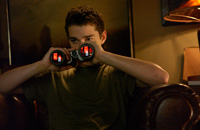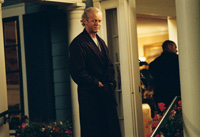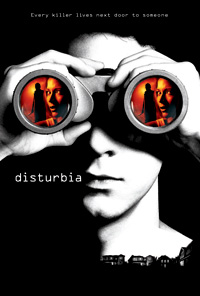Disturbia tells the story of a teenage boy named Kale (Shia LaBeouf), sentenced to 3 months house arrest after punching his Spanish teacher in the face for making a derogatory comment about his father.
Disturbia has been compared to Alfred Hitchcock’s Rear Window. However, it must be said that the only thing that likens Disturbia to Hitchcock’s masterpiece of tension that oozes technical genius is the film’s premise: a person is unable to leave his room and must look out of the window for entertainment and it is during his routine peeping sessions that he discovers that his neighbour might be a killer and tries to get everyone around him to help him uncover the truth. Apart from the premise, everything else is different.
Director D.J. Caruso of 2004’s Taking Lives (starring Angelina Jolie and Ethan Hawke) and 2005’s Two for the Money (starring Al Pacino and Matthew McConaughey) fame has completely created a whole new, different, contemporary world in which our male protagonist assumes the role of the “trapped” person, bound to the boundaries of his home due to a house arrest anklet affixed to his leg.
 Kale gets used to his house arrest predicament comfortably by downloading songs from the iTunes Music Store on his Mac machine and playing endless rounds of online games on his Xbox360 (product placement alert!), but gets into a boredom fix when his Mom cancels his iTunes Music Store subscription, and cuts the cord of his television. He therefore ends up resorting to spying on his neighbours with a pair of binoculars to pass the time.
Kale gets used to his house arrest predicament comfortably by downloading songs from the iTunes Music Store on his Mac machine and playing endless rounds of online games on his Xbox360 (product placement alert!), but gets into a boredom fix when his Mom cancels his iTunes Music Store subscription, and cuts the cord of his television. He therefore ends up resorting to spying on his neighbours with a pair of binoculars to pass the time.
Every window that he spies into is like a different movie to be watched, re-watched, and watched again. There is the couple living across the street mirred in infidelity, the kids down the road (but still within binocular vision) watching porn behind their Mom’s backs, and more.
He spies on his new next door neighbour, an incredibly attractive girl, Ashley (Sarah Roemer). Ashley is the quintessential “breath of fresh air” for depressed Kale, for whom everything is going bad until he sees Ashley move in next-door. Kale therefore befriends Ashley in the hope of “summer romance”, for to him, she signifies all that is hope in the “bleak and boring”
life that he is leading. Together with Ashley and his best friend from school, Ronnie (Aaron Yoo), they camp over at Kale’s house and play silent observers and spies on the entire neighbourhood with a huge array of high-tech surveillance equipment that Ronnie claims came from his “obsessive-compulsive” uncle.
 Kale notices startling similarities between his other next door neighbour’s car and the car of a person last seen with a woman who has been recently reported missing, and suspected to have been kidnapped and murdered. Intrigued, he ropes in his friends to help him find out more, as he is unable to travel beyond the boundaries of his house, this is where Ronnie comes in, because what would a journey for a teen under house arrest be without a sidekick? Ronnie thus becomes Kale’s somewhat reluctant legman to do all his dirty work, because he and Ashley have struck up a romance and he would rather her be beside him far from unknown dangers.
Kale notices startling similarities between his other next door neighbour’s car and the car of a person last seen with a woman who has been recently reported missing, and suspected to have been kidnapped and murdered. Intrigued, he ropes in his friends to help him find out more, as he is unable to travel beyond the boundaries of his house, this is where Ronnie comes in, because what would a journey for a teen under house arrest be without a sidekick? Ronnie thus becomes Kale’s somewhat reluctant legman to do all his dirty work, because he and Ashley have struck up a romance and he would rather her be beside him far from unknown dangers.
Making full use of modern technology, the 3 teenagers use cell phones, the Internet, video cameras, and all sorts of high-tech devices in the quest to uncover the truth behind Mr Turner (David Morse), the next door neighbour that seems to have a hidden secret.
 And the end result is that we have a delightful movie that has seemingly taken an old masterpiece, and given it a completely refreshing overhaul. Disturbia starts out strong, and you immediately get a sense of what the film is all about, with an incredible action scene put together by special effects coordinator Darrell Pritchett and stunt coordinator Manny Perry that seems to set the pace for the film. Instead, the film moves on at a steady pace, before speeding to a climatical ending under excellent direction and incredible camera work.
And the end result is that we have a delightful movie that has seemingly taken an old masterpiece, and given it a completely refreshing overhaul. Disturbia starts out strong, and you immediately get a sense of what the film is all about, with an incredible action scene put together by special effects coordinator Darrell Pritchett and stunt coordinator Manny Perry that seems to set the pace for the film. Instead, the film moves on at a steady pace, before speeding to a climatical ending under excellent direction and incredible camera work.
Throughout the entire film, there is hardly a moment that you’re not kept in suspense. The movie is well-written, with good comedic moments intermixed with scenes that make your heart beat that much faster. It does a perfect job of making you feel both slightly nervous and anxious at the same time. It conveys paranoia and fright through the use of mood and mere suggestions of menace that constantly has you at the edge of your seats.
LaBeouf pulls it off convincingly as Kale, and with this coming after his starring role in Transformers, only serves as notice that he’s the next up-and-coming Hollywood superstar. Well-suited to the role, his acting is great and he really makes you believe and you actually feel his anxiety. Roemer’s girl-next-door is quite possibly the most sensual role this year. It’s not just about her confidence and beautiful sparkling eyes. Her body language makes it work, and you’ll find yourself walking out of the movie feeling as though you’ve fallen in love, just as how Kale does in the movie. Yoo pulls off the role of Ronnie with much comedic fanfare, always supplying the laughs whenever needed, and Carrie-Anne Moss (from The Matrix fame) is very convincing as Kale’s Mom, Julie.
However, it has to be said that the main  driving force of the film is Morse. He’s a gem of a character actor, and is at the top of his craft in his role as the villainous yet mysterious “did he or did he not” neighbourhood serial killer. In Disturbia, he is perfect as the creepy, sly, smiling force accused of kidnapping and killing women, and his screen appearances keep the audience enthralled, eyes hooked to the screen.
driving force of the film is Morse. He’s a gem of a character actor, and is at the top of his craft in his role as the villainous yet mysterious “did he or did he not” neighbourhood serial killer. In Disturbia, he is perfect as the creepy, sly, smiling force accused of kidnapping and killing women, and his screen appearances keep the audience enthralled, eyes hooked to the screen.
With Disturbia, Caruso has proven that it is possible to make a good suspense-filled thriller without all the gore. Disturbia isn’t a horror flick, but it will surely give you more of a fright than any of the recent horror movies (i.e. The Messengers). In fact, Disturbia managed to be a creepy psychological horror thriller yet maintaining its “teen drama-comedy” slant.
Watch Disturbia, you won’t regret it.
Rating: 4/5
Movie Details:
Opens: Aug 2
Running Time: 104 mins
Cast: Shia LaBeouf, Sarah Roemer, David Morse
Director: D.J. Caruso

